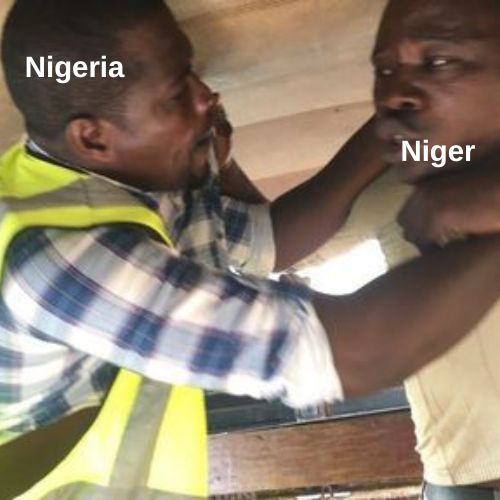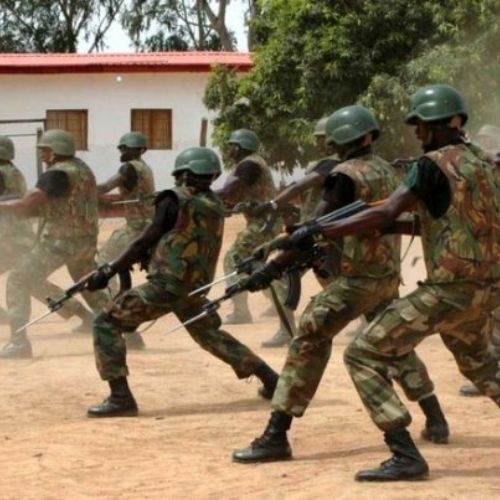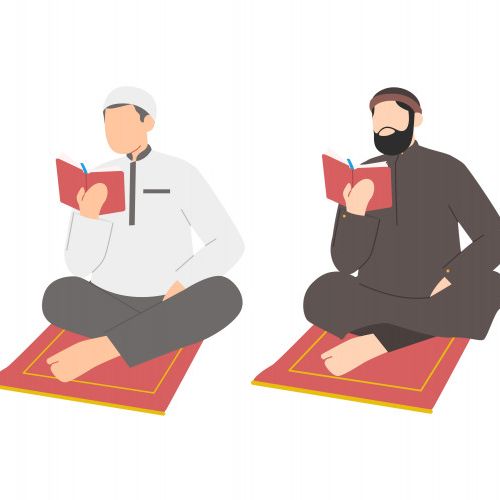The Nigerian experience is physical, emotional, and sometimes, international. No one knows it better than our features on #TheAbroadLife, a series where we detail and explore Nigerian experiences while living abroad.
Our subject of this week’s Abroad Life is a 23-year-old medical student who fled Ukraine six days after the war started. She talks about leaving Nigeria due to the poor condition of our universities, travelling to Ukraine for medical school, and eventually, fleeing the country to escape the war. She’s back in Nigeria, but she won’t stay for very long.
First of all, where are you right now?
I’m in Nigeria. I’ve been here for about six months now. Before then, I spent six years in medical school in Ukraine. I was going to graduate in June (2022), but then, the war broke out. It turned everything upside down, and I had to come back to Nigeria in a hurry.
Tell me about how you left Ukraine
When the war broke out, everyone was trying to leave the country, so the borders got crowded really fast. I lived in Lviv, a city only two hours away from Poland. Lviv was in the extreme west of Ukraine so it was relatively safe compared to the east where the war was actually happening. This didn’t mean we weren’t still terrified of what might come, because we knew it was only a matter of time before other cities were attacked.
My plan was to leave Lviv and cross the border into Poland for safety. I left with my friends very early in the morning on the second day of the war, but the two-hour journey was prolonged by the crazy traffic. Everyone was trying to leave. At some point, the cab driver suddenly said he wasn’t going anymore. There was no hope we would even get there that day, so I understood. We got down and started walking in the cold.
We walked for about six hours till we got to the border. By that time, my hands were numb and I could barely feel my legs. When we got there, we realised the wildest thing — they were only letting white people across the border.
Ah…
Well, not exactly, but if you were from a first-world country, the Ukrainian immigration would let you across. This meant people from Africa were basically an afterthought. We knew Nigeria’s case would be even worse, but we were hoping for the best.
We waited for about four hours hoping to be let across. But when I saw there was nothing coming of our stay at the border, I decided to head back to Lviv because I absolutely couldn’t sleep out there in the cold. I thought I’d die. Some of my friends stayed, but I couldn’t. I have no fighting spirit in me, please.
It was only about 4 p.m., so I thought I could still make it back to the city in time. I started walking back towards the city, flagging down passing vehicles. Luckily, someone was kind enough to drive me home. The ride home wasn’t long at all because there weren’t many people who were going back to the city. I got home around 7 p.m. and went straight to sleep.
For the next three days, I was calling my friends who were at the border to ask for updates on what was happening. I was also constantly checking the news for any new developments with the war. If I was going to die, at least I should know beforehand.
What happened next?
I found out from my friends that some African embassies had started reaching out to border control to let their citizens across. This raised everyone’s hopes, so I decided to head back to the border. By this time, the traffic had reduced but there were still a lot of people at the border. I got there and discovered even though some African embassies had made arrangements for their citizens, Nigeria wasn’t one of them.
Wahala…
Big one. We started begging them to let us across, and the whole thing became really scary because it felt like they were never going to do that. Eventually, they resorted to allowing women, children and old people (50+) across the border into Poland. This meant young boys or middle-aged men couldn’t cross.
I remember these two cousins, a boy and a girl. The girl was in her 20s while the boy had just turned 18. They were going to let her across, but the boy had to stay back. She was begging with tears in her eyes that he be allowed to go with her. They didn’t agree. They gave her two options: she could either go and leave the boy behind or stay back with him. There was no circumstance under which they’d have let him go with her.
I still cry whenever I remember just how destitute we were at the time. I and my friends didn’t have enough food, so we had to share. We were sleeping and waking up with our bags everyday, with our parents worried sick halfway across the world. Worst part was the fact that the Nigerian government was dragging its feet over the issue, and we were being treated like we didn’t even matter.
I was eventually let into Poland two days later based on the women and children clause. Immediately I got in, I took a bus to the evacuation centre in Warsaw, after which I was put on a flight home. Some of my Nigerian friends are still in European countries like Poland and the Netherlands because they’d rather not come back home. Honestly, I don’t even blame them because what would they be coming back to?
Really glad you made it out. But why did you choose Ukraine in the first place?
I honestly never had plans to study in Ukraine to start with. I grew up in Enugu with four siblings, and even though my parents were well-off, we never travelled outside Nigeria. So it never occured to me to study abroad when the time came.
I graduated from secondary school in July 2015, and wrote JAMB like most people. I had a really high score, about 272, and I had good grades in WAEC. So I applied to study medicine at the University of Nigeria, Nsukka. When the admissions list came out, I was offered Medical Laboratory Science instead.
LMAO. How did you take it?
I wasn’t going to accept it, but my dad told me he would find a way to help me have my course changed to medicine. So in the meantime, I resumed school at UNN as a medical laboratory science student in late 2015.
How did you go from there to Ukraine?
I won’t lie, my reason for leaving was actually very petty, but I don’t regret it. The educational system in Nigeria is honestly rubbish. In school, the halls were so full, you couldn’t find a seat. One day, while we were struggling to enter a lecture hall for a class, someone hit my head against the wall. That was the last I was going to have of it.
Like I said, I have no fighting spirit. I went to my hostel, packed all my things and went home. I told my parents I wasn’t going back to school, and my mum supported me.
Ah. A Nigerian mum? Why?
She had seen how much stress I was going through there and knew I wasn’t used to it at all. She was already talking about sending me to school abroad before then. Coming back home simply put everything in motion.
What happened next?
We were initially thinking about the UK, but around that period (early 2016), the exchange rate went higher. A relative, whose child was studying in Ukraine at the time, ended up suggesting it to my parents, and they bought into the idea. It fit everything they wanted. A good medical education they could afford.
How did you start applying to Ukraine?
I honestly didn’t do anything. We found an educational consultancy in Abuja that handled everything. They simply asked me for some personal and academic documents, which I provided. In mid 2016, I got admitted into the the Lviv National Medical University in Ukraine. By september, I was on a flight to Lviv.
Expectations vs reality: Ukraine Edition
I went there with an open mind so I didn’t really have a lot of expectations. I’d never been outside the country in my life, but at least, I thought it would be beautiful. Omo, I was disappointed. I couldn’t even hide my disappointment because it was so obvious, the agent who came to pick me up from the airport had to explain that it was an ancient city.
The buildings were really old. But when I entered some of them, I realised they were beautiful on the inside. I later found out that Ukrainians simply have a culture of preserving things, and so, instead of demolishing buildings to rebuild, they’d just renovate.
Another thing was how much people smoked there. You could literally see a couple pushing a baby in a stroller, and they’d both be smoking. That shocked me. Also, there were instances of passive racial bias. For example, I could be on the bus with other African schoolmates, and when officials stop the bus to ask for our passes, they’d just come straight to us first. Other times, the security at a mall would put more focus on me and my friends as if we came to steal something. I never really cared about all that sha, as long as they’re not beating me or made suggestive remarks towards me. I’ve suffered worse in Nigeria.
You mentioned friends. What was it like settling into school?
It was pretty easy because there was already a close-knit community of Africans in my school. They were very accommodating and helped me settle into life in school. I’d never experienced so much kindness in my life before then. I felt very suspicious and thought they just wanted to steal my money or something.
I was coming from Nigeria where, if someone was being extra nice to you, it was a red flag. But these people were genuinely good to me, and it didn’t even matter which African country you came from. They helped me find permanent accommodation and even gave me a lot of gifts that helped me settle in properly.
I spent the next six years in this tight-knit community, and it was some of the best moments of my life. We used to study in groups, and this really helped my grades. There were times when lecturers had to be extra-prepared when they knew they had Nigerians in their class.
What didn’t you like about Ukraine?
The cold. It can get really brutal. It’s not even the kind of cold where wearing a jacket would do. Your hands would get numb really fast if you ever forget to wear gloves.
Also, the place made me conscious of being a black person. I never experienced anything explicit, but there were occasions in which I was treated differently from people of other races. One time, I sat beside a white woman on a bus, who had a little kid. The moment the child saw me, she started crying.
What’s your favourite thing about Ukraine?
I think it’s the friends I made in school, to be honest. I wasn’t much of an outgoing person, and even the times I went out, it was with my friends.
How’s your relationship with them right now?
We all still talk fairly often, although I’m more in contact with some people than others. I miss them a lot because we spent so much time together, only for our lives to get upended like that. If not for the war, we’d have graduated in June [2022].
How did things go when you came back home?
Initially, we weren’t sure if we’d be transferred to another school to repeat sixth year. But we continued our classes online, finished our programme on time and had our certificates sent to us.
But because we spent two months studying online, Nigeria’s MDCN (Medical and Dental Council of Nigeria) said they wouldn’t recognise our certificates.
Ah… So does that mean for your career?
I don’t even care about those ones. I had plans to work in Nigeria for about four to five years before moving to another country. But right now, I want to move to the US to practice, so I’m currently studying for the USMLE (United States Medical Licensing Examination).
Good luck with that
Thank you.
Want more Abroad Life? Check in every Friday at 9 A.M. (WAT) for a new episode. Until then, read every story of the series here.
Hi! My name is Sheriff and I’m the writer of Abroad Life. If you’re a Nigerian and you live or have lived abroad, I would love to talk to you about what that experience feels like and feature you on Abroad Life. All you need to do is fill out this short form, and I’ll be in contact.




